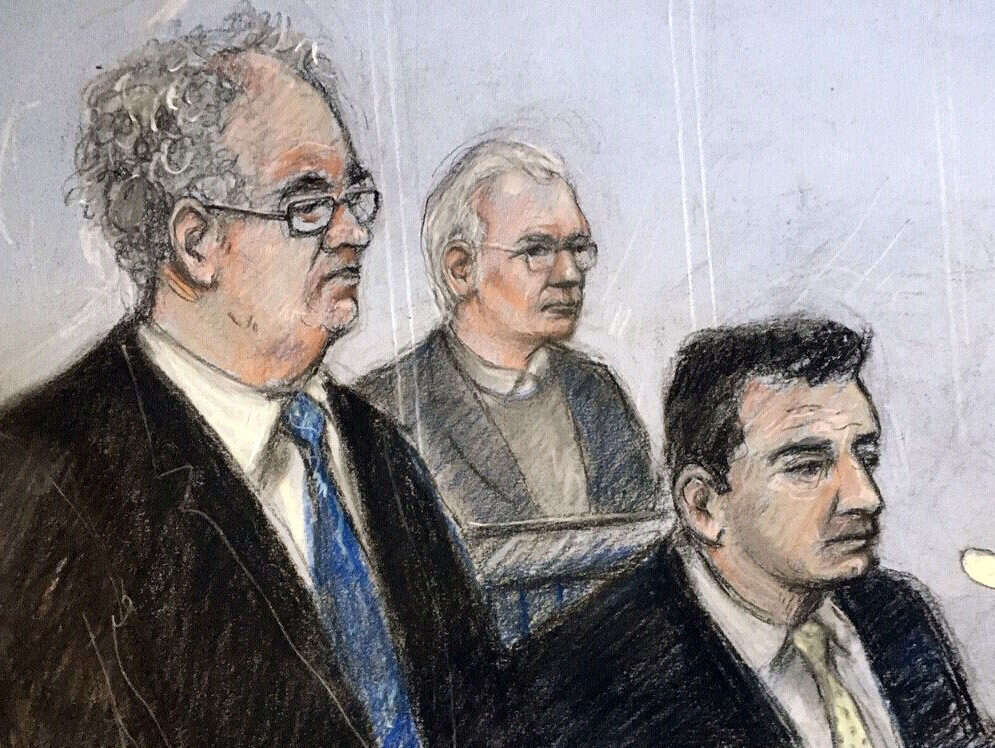
Sources revealed by Wikileaks founder Julian Assange “disappeared” after he put them at risk of torture and murder, a court has heard.
Opening his extradition hearing today, James Lewis QC said the 48-year-old is guilty of “ordinary criminality” by stealing from and hacking into US government computers.
He told District Judge Vanessa Baraitser that Assange (pictured, centre) is not charged with publishing “embarrassing” information the US would rather was not disclosed.
The lawyer said the dissemination of specific classified unredacted documents put dissidents in Afghanistan and Iraq at “risk of serious harm, torture or even death”.
He told Woolwich Crown Court, which is sitting as a magistrates’ court, that the US identified hundreds of “at-risk and potentially at-risk people” around the world and made efforts to warn them.
Lewis said: “The US is aware of sources, whose unredacted names and other identifying information was contained in classified documents published by Wikileaks, who subsequently disappeared, although the US can’t prove at this point that their disappearance was the result of being outed by Wikileaks.”
Julian Assange is fighting extradition to the US where he is wanted to face 18 charges in the Eastern District of Virginia over “one of the largest compromises of classified information” in the country’s history.
Lewis said most of the charges relate to “straightforward criminal activity”, which he described as a “conspiracy to steal from and hack into” the department of defence computer system along with former US army intelligence analyst Chelsea Manning.
“These are ordinary criminal charges and any person, journalist or source who hacks or attempts to gain unauthorised access to a secure system or aids and abets others to do so is guilty of computer misuse,” Lewis said.
“Reporting or journalism is not an excuse for criminal activities or a licence to break ordinary criminal laws. This is true in the UK as it is in the USA and indeed in any civilised country in the world.”
The lawyer said three charges relate to the dissemination of specific documents which put sources at risk.
“By disseminating the materials in an unredacted form, he likely put people – human rights activists, journalists, advocates, religious leaders, dissidents and their families – at risk of serious harm, torture or even death,” he said.
“What Mr Assange seeks to defend by free speech is not the publication of the classified materials, but he seeks to defend the publication of sources – the names of people who put themselves at risk to assist the US and its allies,” Lewis continued.
“He is not charged with the disclosure of embarrassing or awkward information that the government would rather not be disclosed. The disclosure charges are solely were there was a risk of harm.”
Lewis described Assange’s lawyer’s claims that he would face up to 175 years in jail if found guilty of the charges as “hyperbole”, although he did admit that any sentence would be a matter for the US court.
Representing Assange, Edward Fitzgerald QC outlined his defence, saying: “Prosecution is not motivated by genuine concern for criminal justice but by politics.
“This extradition should be barred because the prosecution is being pursued for political motives and not in good faith.”
Fitzgerald (pictured, left) argued the extradition request was part of a wider political war on journalists under President Donald Trump, rather than seeking justice.
He continued: “President Trump came into power with a new approach for freedom of the press… amounting effectively to declaring war on investigative journalists.
“It’s against that background the Trump administration decided to make an example of Julian Assange, he was the obvious sign of everything Trump condemned.”
He added extradition would be the “height of inhumanity”, exposing him to inhumane conditions in an American prison, leading to a high risk of suicide.
The lawyer later said that Assange’s actions were misrepresented by the request, particularly assisting Chelsea Manning in accessing confidential information and disclosing unredacted sensitive material.
Fitzgerald told the court: “It’s completely misleading to suggest it was Julian Assange and Wikileaks to blame for the disclosure of unredacted names.
“Wikileaks only published the unredacted material after they had been published by others who have never faced prosecution.”
Fitzgerald told the court Assange did not assist Chelsea Manning in accessing or decoding the leaked documents.
Wearing a grey suit, and grey sweater over a white shirt, Assange spoke only to confirm his name and date of birth in front of supporters in a full public gallery, including his father, John Shipton.
Scores of protesters, some of whom had pitched tents nearby, made so much noise that they could be heard inside the courtroom.
The noise, which included a siren, chanting and singing, was so loud it prompted Assange to address the court before the lunch break.
He said: “I’m having difficulty concentrating. All this noise is not helpful either.
“I understand and am very grateful of the public support and understand they must be disgusted…”
But the judge stopped him from speaking, instead asking his lawyer, Edward Fitzgerald QC, to address her.
He said: “What Mr Assange is saying is he can’t hear and can’t concentrate because of the noise outside.”
The extradition hearing will be adjourned at the end of this week of legal argument and continue with three weeks of evidence scheduled to begin on 18 May.
The decision, which is expected months later, is likely to be appealed by the losing side, whatever the outcome.
Assange has been held on remand in Belmarsh prison since last September after serving a 50-week jail sentence for breaching his bail conditions while he was in the Ecuadorian embassy in London.
He entered the building in 2012 to avoid extradition to Sweden over sex offence allegations, which he has always denied and were subsequently dropped.
Picture: Elizabeth Cook/PA Wire
Email pged@pressgazette.co.uk to point out mistakes, provide story tips or send in a letter for publication on our "Letters Page" blog
